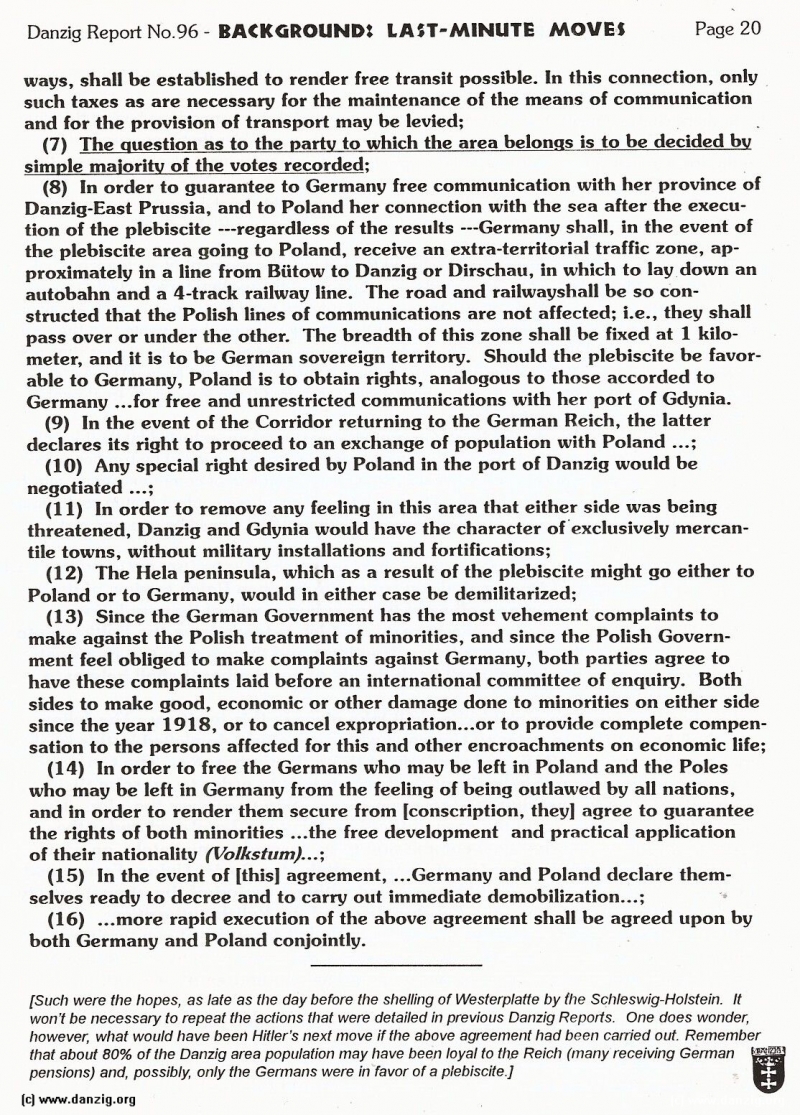
ways, shall be established to render free transit possible. In this connection, only such taxes as are necessary for the maintenance of the means of communication and for the provision of transport may be levied;
(7) The question as to the party to which the area belongs is to be decided by simple majority of the votes recorded
(8) In order to guarantee to Germany free communication with her province of Danzig-East Prussia, and to Poland her connection with the sea after the execut ion of the plebiscite ---regardless of the results ---Germany shall, in the event of the plebiscite area going to Poland, receive an extra-territorial traffic zone, app roximately in a line from Bütow to Danzig or Dirschau, in which to lay down an autobahn and a 4-track railway line. The road and railwayshall be so cons tructed that the Polish lines of communications are not affected; i.e., they shall pass over or under the other. The breadth of this zone shall be fixed at 1 kilom eter, and it is to be German sovereign territory. Should the plebiscite be favora ble to Germany, Poland is to obtain rights, analogous to those accorded to Germany .. .for free and unrestricted communications with her port of Gdynia.
(9) In the event of the Corridor returning to the German Reich, the latter declares Its right to proceed to an exchange of population with Poland ...;
(10) Any special right desired by Poland in the port of Danzig would be negotiated ...;
(11) In order to remove any feeling in this area that either side was being threatened, Danzig and Gdynia would have the character of exclusively mercant ile towns, without military installations and fortifications;
(12) The Hela peninsula, which as a result of the plebiscite might go either to Poland or to Germany, would in either case be demilitarized;
(13) Since the German Government has the most vehement complaints to make against the Polish treatment of minorities, and since the Polish Governm ent feel obliged to make complaints against Germany, both parties agree to have these complaints laid before an international committee of enquiry. Both sides to make good, economic or other damage done to minorities on either side since the year 1918, or to cancel expropriation...or to provide complete compens ation to the persons affected for this and other encroachments on economic life;
(14) In order to free the Germans who may be left in Poland and the Poles who may be left in Germany from the feeling of being outlawed by all nations, and in order to render them secure from Iconscription, theyl agree to guarantee the rights of both minorities . . .the free development and practical application of their nationality (Volkstum)...;
(15) In the event of Ithisi agreement, ...Germany and Poland declare thems elves ready to decree and to carry out immediate demobilization...;
(16) ...more rapid execution of the above agreement shall be agreed upon by both Germany and Poland conjointly.
(Such were the hopes, as late as the day before (he shelling of Westerplatte by the Schleswig-Holsfein. It won’t be necessary to repeat (lie actions (hat were detailed in previous Danzig Reports. One does wonder, however, what would have been Hitler’s next move if the above agreement had boen carried out. Remember that about 80% of the Danzig area population may have been loyal to the Reich (many receiving German “ pensions) and, possibly, only the Germans were in favor of a plebiscite.)
Danzig Report Vol. 1 - Nr. 96 - July - August - September - 1997, Page 20.
Hits: 2311
Added: 20/07/2015
Copyright: 2024 Danzig.org

